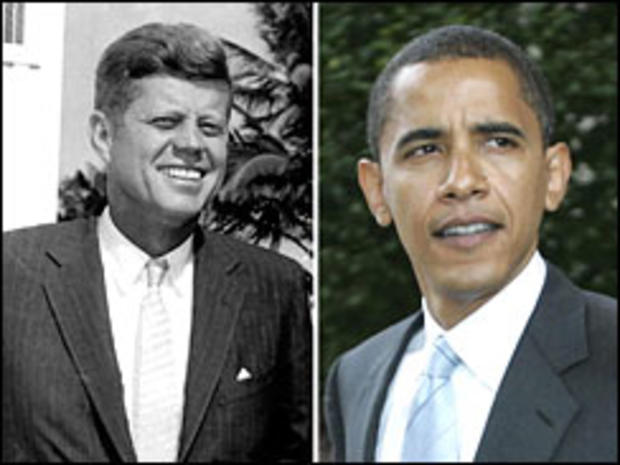JFK and Obama: Their Similarities and Differences
(CBS) History shows that despite their differences in ideology, most U.S. presidents have qualities in common with their predecessors.
On this fiftieth anniversary of the Inauguration of John F. Kennedy, President Obama is marking the midpoint of his four-year term in office. The comparisons are inevitable as Mr. Obama begins the third year of his presidency, a year in office that Kennedy left unfinished.
(Scroll down to see Kennedy's entire Inaugural address.)
- Kennedy
was a skilled politician, an able orator and indefatigable campaigner. Mr.
Obama is viewed much the same way.
- Both men
won the presidency as junior U.S. Senators from their home
states running against more experienced Republican opponents.
- Each
took office after eight years of a GOP president of whom the nation had
grown tired.
- Both new
presidents enjoyed the advantage of having their own party in control of Cngress.
- Kennedy was an avid golfer as is Mr. Obama.
Both leaders faced challenges and crises at home and abroad. There are both similarities and stark differences in the way they responded.
Kennedy sent Congress the most comprehensive and far-reaching civil rights bill. It wasn't enacted on his watch. Mr. Obama did the same on health care reform. It took over a year but he narrowly succeeded in getting his plan enacted. Tuesday, however, the GOP-controlled House voted to repeal it.
Kennedy had to deal with a superpower cold war that nearly turned hot in U.S. showdowns with the Soviet Union over nuclear missiles in Cuba and the construction of the Berlin Wall
The nuclear threat facing Mr. Obama comes from rogue states North Korea and Iran in the hands of megalomaniacal leaders happy to thumb their noses at the world. Efforts to get those two countries to end their nuclear programs have so far failed.
A year into his presidency, Kennedy approved a plan to send American military advisors to South Vietnam.
A year into his presidency, Mr. Obama announced plans to send 30,000 more U.S. soldiers to Afghanistan as part of a strategy to eventually downsize the American military commitment there. The U.S. combat role in Iraq ended 18 months into Mr. Obama's presidency.
Kennedy was named Time Man of the Year in 1962. Mr. Obama was awarded the Nobel Peace Prize nine months after taking office.
Kennedy ordered federal departments and agencies to end discrimination against women in appointments and promotions. Mr. Obama succeeded in passing a measure to end the discriminatory treatment of gays in the military.
In a showdown with the steel industry, Kennedy brought about a rescission of steel prices. Mr. Obama overcame opposition from Wall Street and enacted a financial regulatory reform bill. He also defeated banker opposition to new regulations of the credit card industry.
While the most memorable words of Kennedy urged Americans to focus on what they could do for their country, Mr. Obama is viewed or portrayed as a liberal with a bottomless appetite for providing more and more government services.
And both leaders wanted the same thing as first term presidents: a second term. That was one of the reasons Kennedy went to Dallas in November 1964.
